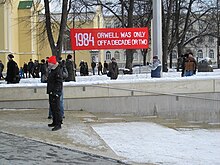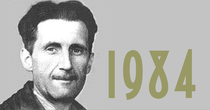
| External videos | |
|---|---|
 | |
Orwellian is an adjective describing a situation, idea, or societal condition that George Orwell identified as being destructive to the welfare of a free and open society. It denotes an attitude and a brutal policy of draconian control by propaganda, surveillance, disinformation, denial of truth ( doublethink), and manipulation of the past, including the " unperson"—a person whose past existence is expunged from the public record and memory, practised by modern repressive governments. Often, this includes the circumstances depicted in his novels, particularly Nineteen Eighty-Four, [2] despite the narrative depicting a society in which only governmental employees are under repressive scrutiny, but political doublespeak is criticized throughout his work, such as in Politics and the English Language. [3]
The New York Times has said the term is "the most widely used adjective derived from the name of a modern writer". [4] [5]
See also
References
- ^ Noah Tavlin. "What "Orwellian" really means". TED Ed. Retrieved 4 October 2015.
- ^ Drabble, Margaret (2000). The Oxford Companion to English Literature (Sixth ed.). Oxford and New York: Oxford University Press. p. 726. ISBN 0-19-861453-5.
- ^ Traub, James (5 January 2016). "The Empty Threat of 'Boots on the Ground'". The New York Times.
- ^ Nunberg, Geoffrey (22 June 2003). "Simpler Terms; If It's 'Orwellian,' It's Probably Not". The New York Times. ISSN 0362-4331. Retrieved 27 February 2018.
- ^ Jordison, Sam (11 November 2014). "Do you really know what 'Orwellian' means?". the Guardian. Retrieved 27 February 2018.